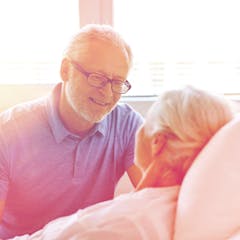
Articles on Cancer care
Displaying all articles

Patients with incurable cancer want to be informed about their disease and its treatment, but must also maintain hope. This inner conflict can affect how they process information about their prognosis.

Olivia Newton-John made a significant contribution to cancer care, cancer survivorship and the ideal of treating the whole person, not just their disease.

In the latest ‘Thor’ movie, the character Jane Foster raises questions about the impact of cancer on ideas of worthiness, responsibility and power — and what it means to be a superhero.

Palliative care is about living well and meeting patients’ goals, but referral can be more complex than access to medical assistance in dying (MAID). Palliative care should be as accessible as MAID.

Inuit living in their traditional territory must travel long distances — often with no personal support — for specialized health-care services like cancer care, obstetrics and dialysis.

A ‘shared decision-making’ model enables collaboration with Indigenous communities within Canada’s health-care system - to respond to TRC Calls to Action and address rising cancer rates.

Health has taken centre stage of the election campaign. Here’s what you need to know to make sense of the claims (and counter claims) of the major parties so far.

A recent study found that many people who have survived a cancer diagnosis do not like to be called ‘survivor.’ As World Cancer Day is observed on Feb. 4, their wishes are something to think about.

I have worked on this problem for many years, and to be honest it still blows my mind to really think about just how complex it is.

Prostate cancer is the second deadliest cancer among men, but not all types of the disease are as deadly as others. That has led to confusion over screening. An expert explains why new guidelines make sense.

Historically the advice to cancer patients was to rest and avoid activity. We now know this advice may be harmful to patients, and that every person with cancer would benefit from exercise medicine.

Cancer care is often impersonal, industrial and needlessly stressful. Allowing patients to witness personal introductions between their physicians would help ease their anxiety and build trust.

Just because a person is dying does not mean that he or she is in a state of panic. Here’s an example of how one woman, through a well-lived life, remained at peace as she faced death.

NSW is about to embark on the largest and most definitive clinical trial ever of medicinal cannabis for chemotherapy-induced nausea and vomiting.

Most of us would agree that cancer drugs should be listed on the PBS, no matter how dear. But our health system can’t afford all of them. How then are decisions about which drugs to subsidise made?






